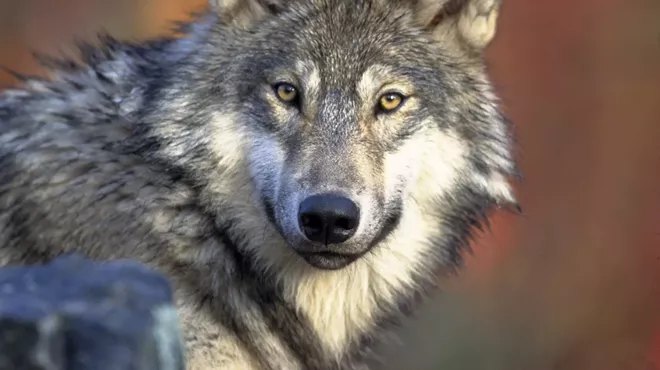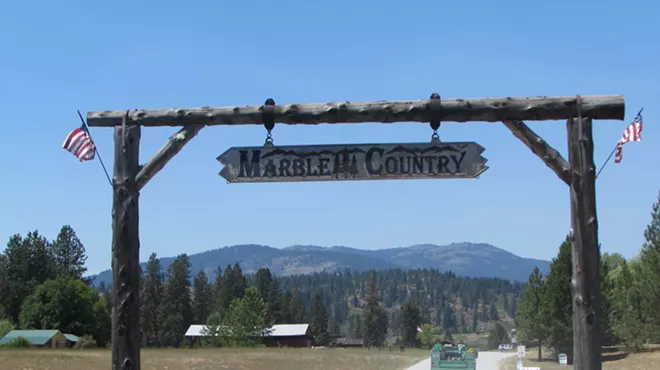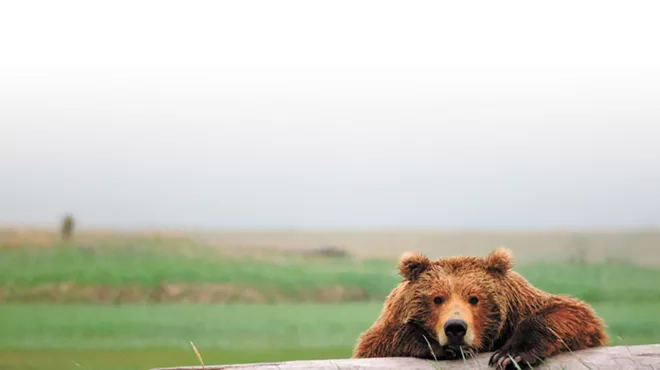
Gary Kramer/USFWS photo, collage by Daniel Walters
Violent comments on environmental Facebook groups have worried the Washington Department of Fish and Wildlife.
This comes after private chat records, leaked by former Shea acolyte Jay Pounder, features Shea taking part in chats where his allies discuss elaborate violent fantasies against local liberal activists.
As the Inlander reported early this year, those chat messages included Anthony Bosworth — the guy Shea gave a "2016 Patriot of the Year" award to and sent down to the Malheur National Wildlife Refuge to de-escalate tensions — discussing a proposal to send severed wolf parts to Kieran Suckling, executive director of the Center for Biological Diversity, an aggressive environmental rights group.
"Get me the testicles off a North Idaho wolf and I'll send it to him," Bosworth writes.
"This is not something to put out electronically," Shea wrote. "We need to meet f2f."
But an Inlander records request for all documents related to the decision to cancel the meetings didn't turn up any explicit threats from anti-wolf extremists. Instead, it turned up multiple violent social media threats from wolf supporters, including on the Facebook page of the Center for Biological Diversity.
According to the WDFW, most of the threats and harassment the organization has observed around the wolf issue has come from the environmental side, both locally and nationally. At times, the agency has raised concerns about online comments with the FBI.
In early August, the Center for Biological Diversity called its Facebook fans to action, warning them that, in the name of protecting cattle, the Washington Department of Fish and Wildlife was planning to kill more members of the Old Profanity Peak pack in Ferry County.
The center posted the work phone numbers of Washington Fish and Wildlife Director Kelly Susewind and Jay Inslee, and urged their followers to tell them you "oppose this continued assault on Washington's endangered wolves."
Commenters were furious at the government employees. One — an executive at a computer shop in Illinois — reacted to by appearing to call for the murder of Washington Fish and Wildlife employees.
"Kill the state officials responsible for the crime," he wrote on Aug. 6. "Now. Immediately. Ask if I can help. I have no arms, but can shoot or move my hands." (The Inlander has edited these social media quotes slightly to correct typos.)
Officials also flagged the following comments during August:
- On a post from the Wolf Conservation Center, a commenter wrote, "I wish someone, ANYONE, would shoot the sharpshooters! I feel that would be a better solution," while another wrote, "I would kill every man that wants to kill nature. This is what nature needs now, dead stupid people."
- On the "Save Wolves Now — Pacific Rim" Facebook group one commenter wrote that "our nation needs to take lethal action against WDWF!!!!" while a second confirmed that "I would like to take lethal action."
- At the "Protect the Wolves" Facebook group, one commenter reacted to a post about WDFW hunting wolves from a helicopter by writing "Shoot them in the knee caps as they are not human." "Hopefully the helicopter will crash and kill all these dumbf—-s" one commenter wrote, while a second wrote "Can I say, 'rocket launcher'?" and a third wrote "Shoot the bird down in the sky"
- On the Western Wildlife Conservation Facebook page, someone wrote "they also flew over my land. I pulled out the .30-30. I will shoot them down next time."
- At Wolfwatcher Facebook page, commenters expressed similar sentiments, with one writing "I wish I could be there to shoot down that plane" and another writing "Shoot down the planes!"
But WDFW also stresses that the online comments weren't the only factor. They also took into account information — not explicitly outlined in public records — from law enforcement on the ground.
"As we were approaching the public meeting segment, our law enforcement came to us and said, 'As our ongoing work for monitoring these threats [continues,] we don’t believe we can ensure the safety of our citizens at those meetings,'" Donny Martorello, wolf policy lead with the WDFW says.
The Age of the Death Threat
When the Inlander alerted Suckling about the threatening comment on the Center for Biological Diversity Facebook page, Suckling says he made sure his staff found the comment, deleted it and banned the commenter.
He says he's surprised the comment got through his organization's moderation process, which alerts his staff if anyone uses certain words — like "kill" — his team is flagged so they can delete it if it's a threat.
"We have a system on Facebook that looks for keywords and comments and notifies if certain keywords come up, so we can go and see what’s going on," Suckling says. "I don’t know how this one got past our filter. More likely somebody missed our notification."
But he says that moderation can be challenging — on an open page, you can't decide who shows up and starts commenting.
August, when the meetings were canceled, was a particularly incendiary month for this issue. On Friday, Aug. 16, wolf advocates successfully won an injunction to stop WDFW from killing more members of the Old Profanity Peak pack — but just hours earlier, state officials had killed almost all remaining wolves in the pack.
But even as environmental groups on Facebook expressed their outrage, some groups urged their commenters to tone it down a little bit.
"Please DO NOT make threatening comments about WDFW staff or their families on my Facebook page, or on any Facebook page," Amaroq Weiss, senior West Coast wolf advocate for the Center for Biological Diversity, wrote on her Facebook page that month. "The Center for Biological Diversity condemns all threats of violence and I personally condemn all threats of violence as well. WDFW is finding such comments on Facebook and using them to discredit wolf supporters in court. It's not appropriate no matter the circumstances — and it's harmful to our cause."
She promised to delete such comments and encouraged other pages to do the same. A few other pro-wolf activist pages followed suit.
"STAND FOR WOLVES is asking you DO NOT make threatening comments about WDFW staff or their families or on any Facebook page," the "Stand for Wolves" account posted on Aug. 20. "These comments will be deleted and you will be banned from the page. Also, there is to be no cursing or name-calling, name-calling is senseless and makes advocates look bad as well."
"It's hard not to make killing comments [considering] what they are doing to our wolves!" one commenter responded.
"I agree it is hard, but they are using Facebook comments of advocates to discredit wolf supporters in court," Stand for Wolves responded, "this is only going to hurt the wolves."
In this age, whether the issue is Drag Queen Story Hour, the Teacher of the Year, or simply being a high school girl, the social media landscape is rife with death threats.
Andrew Marantz, a New Yorker writer who embedded with internet trolls for his recently released book, Antisocial: Online Extremists, Techno-Utopians, and the Hijacking of the American Conversation, suggests the apparent frequency in death threats in social media is related to how quick and easy it is to communicate without consequences.
"It's the new road rage," Marantz writes in a Twitter direct message. "Or maybe an even lower threshold than that: the new honking, or the new giving someone a finger through your closed windows. Costs nothing, and it apparently helps people blow off steam."
And, to anyone who remembers the online furor over the dentist who killed Cecil the Lion, stories about the death of animals are particularly prone to sparking violent comments.
"Wildlife killing, especially killing of bears, lions and wolves, draws in a lot of people who are passionate, but also angry and some go way over the top as you’ve seen," Suckling says. "It’s something we've had to deal with a lot over the years."
"On the surface, it’s about the lethal removal of wolves. But there’s a deep-rooted identity-based conflict beneath that." Martorello says. "In some ways, the wolf side of this is easy and straight-forward. It's the people side of this that’s difficult."
"There are endless numbers of bombastic yahoos on Facebook and Twitter, and they’re threatening everybody for everything," Suckling says. "Is this unusual for the social media swamp we all live in? No, it’s not. It's bad, [but] there’s no evidence of any realistic threat here."
Up Close and Personal
But Martorello says that the issues go beyond just social media hyperbole. At times, he says, WDFW staff members have been worried enough to take serious measures to protect their safety.
"We’ve had staff take it to the level where they needed to change how they look, change their hairstyle, grow out their hair, because of their concerns for their personal safety," Martorello says.
A few years ago, Martorello says, he got a series of "'I'm coming for you'" emails from someone angry about Fish and Wildlife killing wolves. It concerned him so much he put his family in a hotel room for two days.
In 2017, Gov. Jay Inslee signed a bill hiding identifying information about employees or contractors who are legally killing wolves in the state, ranchers who'd had cattle killed by wolves, and even those participating in state programs aimed at preventing wolf attacks.
Joey McCanna, wildlife conflict supervisor, testified before the Sunshine Committee in February about what he saw as the continued need for the exemption.
“Threats started in 2014,’ McCanna said. “We had wolf advocates that were following my staff actually back to their residence in Spokane, and sitting outside of their house and filming them. And they would follow them when they would leave.”
Two years later, during the first big conflict over the Profanity Peak pack, he says he would get stopped in the mountains by people he'd never met before, who somehow knew his full name and what he did.
"I have a wife and three kids and two grandkids," McCanna says. “I had people sitting outside my residence taking photos of my residence when I wasn’t there. I was concerned about the safety of my family."
But, if possible, even more hatred is directed toward the ranchers and their families. Martorello says he's heard from multiple ranchers who say their children have been the subject of threats.
Much of that anti-rancher animosity has been directed toward Len McIrvin, a vocally anti-wolf rancher at the controversial Diamond M Ranch in Ferry County. McIrvin doesn't soft-pedal how he feels about environmentalists.
"Those people are insane. They are animal worshippers," McIrvin tells the Inlander. "They're not environmentalists, they’re degenerates. Anybody that worships animals over the rights of people to own property, I call them degenerates."
McIrvin says he doesn't browse social media. Instead, he receives the threats that come the old-fashioned way: over the telephone.
"I know there's a lot of wild talk on the internet and the computers," McIrvin says. "These are personal threats over the phone."
Whenever there's a wolf killing, he says, he gets calls all through the night, from people all across the country.
"We’ve had them tell us, 'If you want to see your [grandkids] come home on the school bus tonight, you better stop harassing the wolves."
He says his wife has been threatened too.
"They said they’d rather shoot her than have a wolf be shot," McIrvin says.
McIrvin says he's shared some of these calls with local law enforcement and the FBI, has often been told that the people calling him weren't technically breaking the law. While "true threats" are illegal, the First Amendment protects a lot of threatening sounding language, particularly when it comes to political speech.
The Supreme Court, for example, has ruled that the statement, "If they ever make me carry a rifle the first man I want to get in my sights is LBJ" is still protected by the Constitution.
Most of the threats, he says, he lets just wash over himself like "water off a duck's back." But it can be hard to tell the difference between heated talk and a real threat.
"The people that hide behind the phone, you don’t know whether to take them seriously," McIrvin says.
He says callers have threatened to shoot his cattle every time a wolf gets killed. At the end of August, the Stevens County Cattlemen's Association offered a $15,000 reward for information leading to the identity of the person allegedly shooting cattle in Northeast Washington, suspecting cattle were being shot in retaliation for wolf deaths.
At times, ranchers who aren't even in the United States have been the subject of misdirected threats
"OK, people apparently there is a Diamond M Ranch in Alberta Canada and the poor owner is getting threats," the Protect the Wolves Facebook group posted in August. "So please people if you are going to make comments, not threats, make sure you have the correct location! The Diamond M Ranch that is owned by McIvrin is not in Canada, it's in Washington. The packs that are being slaughtered are in Washington, not Canada!"
Enemy of My Enemy is My Enemy
If there's one belief that unites environmentalists like Suckling and ranchers like McIrvin it's a

Photo courtesy of Matthew Konkle
A sticker on a sign argues that WDFW = Enemy. "The struggles in my district appear to be escalating faster than solutions are being provided by our decision-makers," Matthew Konkle, a WDFW enforcement officer in Northeast Washington, wrote in an email to colleagues.
"It had nothing to do with safety. It was a way out for [WDFW Director] Susewind. He knew there was going to be a no-win situation," McIrvin says.
McIrvin speculates that the WDFW knew that in-person meetings would be attended by cattlemen who'd had their herds attacked by wolves — but those same ranchers wouldn't bother to participate in an online webinar.
"Fish and Wildlife has an agenda and that’s to put us out of business with the wolves," McIrvin says.
Suckling suspects the opposite motivation but comes to the same conclusion.
"It does not want to do those public hearings," Suckling says. "The state knows very well that the vast majority of people will come out to the hearing and tell them to stop killing wolves. They don’t want that. The state represented at the end of the day, the interest of a small group of ranchers, but not the interests of the majority of citizens."
One document, obtained through the Inlander's public record requests, shows that WDFW worried that canceling the August meetings would result in "less public engagement during this process," would mean "giving in to fear tactics" and would be a "huge hit to transparency/credibility."
But at the same time, WDFW administrators worried that if they didn't cancel the meetings, and something violent happened, that would be an even bigger blow to the organization's credibility — and conscience. Martorello stresses that they haven't given up. With wolf numbers rising, a time will come when the species will be taken off the state's endangered species list. And next year, they're planning to hold public meetings to discuss what policies to put in place that happens.
And yes, they're expecting to hold some of those meetings in Northeast Washington.
CORRECTION: The original version of this story misidentified the advocacy group that won an injunction temporarily protecting the Old Profanity Peak Pack.





